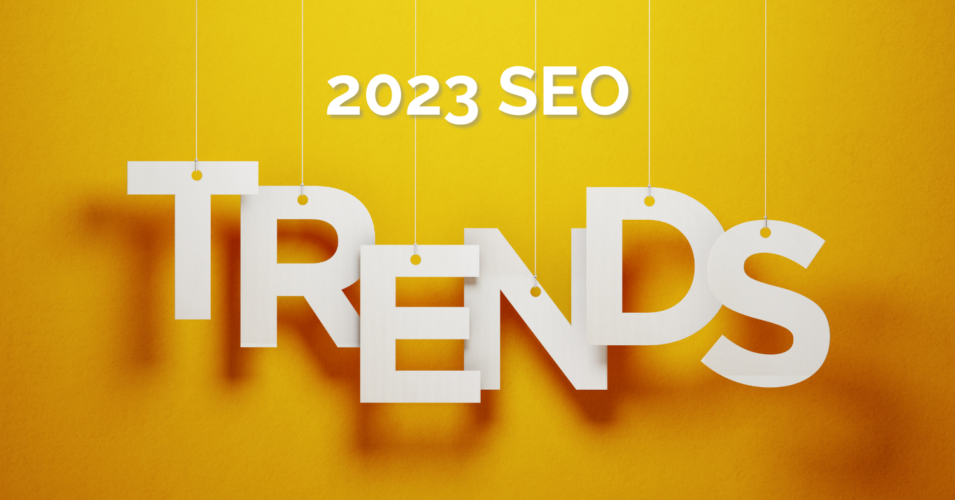Search engine optimization (SEO) is constantly evolving as search engines like Google update their algorithms and user behavior changes. Currently, SEO focuses on creating high-quality, relevant content and building a solid backlink profile. Additionally, technical SEO elements such as website speed and mobile friendliness also play a crucial role in ranking on search engine results pages (SERPs). However, now that we’re well into 2023, SEO industry news points to innovative trends expected to shape the future of SEO and influence how businesses optimize their websites for search engine visibility.
Artificial Intelligence and Machine Learning
Artificial intelligence (AI) and machine learning (ML) are rapidly becoming integral components of online marketing and have received a lot of publicity as one of the most interesting trends in SEO. These technologies allow businesses to analyze and understand large amounts of data, which can be used to improve their search engine rankings and visibility. Additionally, machine learning SEO algorithms can be used to predict what keywords and phrases will be most valuable for a business to target, helping them optimize their content for the most relevant search queries.
Optimizing for AI in SEO means creating a website that is not only technically sound but also rich in high-quality, relevant, and informative content. AI algorithms used by search engines look for clear, concise content optimized for the user experience. Plus, structured data and schema markup will help search engines better understand your website content, leading to improved visibility on SERPs.
Voice Search
Voice search is an increasingly popular way for users to interact with search engines. It allows users to speak their search queries rather than typing them into a text box, and it’s becoming more prevalent as more people use smart speakers and other voice-enabled devices. This shift towards voice search has significant implications for SEO.
Optimizing for voice search requires businesses to focus on long-tail keywords and phrases, use structured data and schema markup, and ensure their website is mobile-friendly, as more and more people are using voice search on their mobile devices.
To optimize for voice search, businesses should also focus on creating content that answers questions, as voice search queries are often phrased as questions. By creating content tailored to the specific needs and interests of their target audience, businesses can improve their chances of being discovered through voice search.
Visual Elements and Video Content
Visual elements and video content are becoming increasingly important for SEO in 2023. This means that companies must create high-quality visual content optimized for search engines. Additionally, any visual search optimization strategy should focus on images and videos with relevant keywords and schema markup to help to improve their visibility on SERPs.
Video content is also an increasingly important part of SEO and video digital marketing. Embedding videos on your website and optimizing them for search engines can improve visibility on SERPs and encourage users to stay longer and explore more of your website’s content. Additionally, videos are more likely to be shared on social media, leading to increased organic traffic and backlinks to your website.
Third-Party Cookie Deprecation
Third-party cookies are small text files placed on a user’s device by a domain other than the one the user is visiting. They have been widely used for various purposes, such as tracking users’ browsing behavior, personalizing ads, and analyzing website traffic. However, due to privacy concerns and regulations, browser companies like Chrome, Firefox, and Safari have announced plans to phase out support for third-party cookies soon.
This deprecation will significantly impact businesses relying on third-party cookies to track and target their audience. They will have to find alternative ways to collect and use data, such as first-party cookies or browser APIs, which can be less accurate and more difficult to implement. Additionally, it will change how advertisers target their ads. They will have to rely on other forms of targeting, such as contextual or demographic targeting, which may not be as effective as behavioral targeting.
Google SERP Features and Positioning
Google’s search engine results page features appear on the SERP in addition to the traditional blue links to websites. These features include featured snippets, knowledge panels, local packs, and images to provide a better user experience. The positioning of these elements on the SERP can significantly impact a website’s visibility and click-through rate (CTR).
For businesses, understanding and optimizing for these SERP features can be a crucial part of their SEO strategy. For example, appearing in the top position for a featured snippet can drive a significant amount of traffic to a website. Additionally, with the increasing use of voice search, optimizing for these SERP features is important as they are highly likely to appear in voice search results.
However, it’s important to note that Google’s algorithm is constantly evolving, and the appearance and positioning of these SERP features can change over time. This is why businesses need to keep an eye on the SERP features and adapt their SEO strategy accordingly to ensure they take advantage of the opportunities presented by these features.
Google Analytics 4
Google Analytics 4 (GA4) is the latest version of Google Analytics, which was introduced to provide a more comprehensive and accurate way of measuring and understanding user behavior on websites and apps. Unlike Universal Analytics (UA), the previous version, GA4 offers several new features such as tracking user interactions across multiple devices, offline conversion tracking, and built-in machine learning capabilities. Additionally, GA4 provides more granular data privacy controls and is built to align with Google’s measurement and data privacy initiatives.
For businesses currently using UA, transitioning to GA4 will involve creating a new GA4 property and migrating data from the existing UA property. The process can be done in a few steps:
- Create a new GA4 property and link it to your Google Ads account if you have one.
- Set up your GA4 property by configuring the data streams and events you want to track.
- Use the GA4 migration tool to import your historical data from UA to GA4.
- Update your website or app tracking code to the new GA4 tracking code.
- Test your GA4 implementation to ensure that data is collected and reported correctly.
It’s important to note that GA4 and UA will coexist for some time, so it’s possible to continue using UA while gradually transitioning to GA4. However, keep in mind that eventually, support for UA will be phased out, and it’s recommended to start the transition process as soon as possible.
FAQ
Q: Do I need SEO?
A: Search engine optimization is a critical component of digital marketing that involves optimizing your website and content to rank higher on search engine results pages for relevant keywords and phrases. By appearing at the top of search results, your business can attract more traffic, generate more leads, and ultimately increase revenue. Therefore, SEO is a must-have if you want your website to be visible and attract more customers.
Q: What SEO techniques will still be effective in 2023?
A: In 2023, effective SEO techniques will likely include creating high-quality, relevant content for your audience, optimizing for keywords, building backlinks from reputable sources, and ensuring your website is mobile-friendly and has a fast load time. Additionally, it will be essential to have a well-structured website with clear navigation and header tags. Using schema markup to enhance the appearance of your website in the SERPs and having a strong social media presence will also be necessary. These traditional SEO techniques have stood the test of time and will still be relevant in 2023.
Q: What is happening to UA that makes me need GA4?
A: One of the main changes in GA4 is that it is built on a different data model than the previous version. GA4 uses a machine learning model to identify automatically and group similar interactions on a website into “events,” which can be used to understand user behavior better. Another major change in GA4 is that it is focused on providing more actionable insights and predictive analytics. Also, GA4 provides more privacy-friendly features, more accurate tracking and measurement of user interactions across different devices and platforms, and more robust reporting and visualization capabilities. These will all provide new capabilities and insights that can help you better understand your website visitors and make data-driven decisions that can grow your business, unlike what the extent of UA has to offer.
Welcome To the Future of SEO in 2023
Overall, these SEO predictions for 2023 highlight how the future of SEO is constantly evolving and adapting to changes in search engine algorithms, user behavior, and technology. Businesses that want to succeed in the future of SEO must be aligned with the latest SEO updates, trends, and best practices. Keeping an eye on SERP features and understanding the importance of tools such as Google Analytics 4 will be key for businesses to optimize their SEO strategy and stay ahead of the competition.
If your organization needs a lending hand or expert advice in developing a successful SEO strategy for 2023, contact the digital marketing experts of Zero Gravity Marketing. We offer the best SEO services in CT that will help you stay ahead of the competition and maximize visibility on search engine results pages. We look forward to helping you reach your digital marketing goals.









